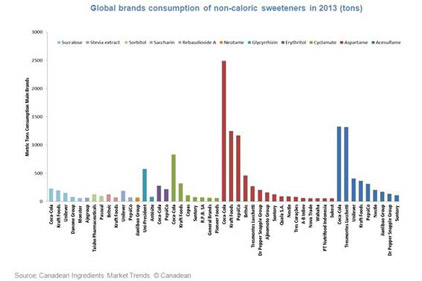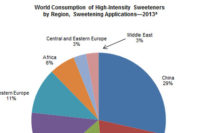Rising Demand for Natural Sweeteners
New Canadean report on non-caloric sweeteners

The concerns about obesity and related health problems plus sugar taxes in many countries have stimulated the market for non-caloric sweeteners. Particularly the natural plant-derived sweeteners such as Stevia are getting popular as more people look for natural products.

|
As a result of increased focus on sugar calories, the consumer demand for non-caloric sweeteners is projected to grow 5% a year until 2017. Of the 360 new products picked up in 2013, 38.3% contained non-caloric sweeteners. Caloric sugar still hold the majority of the global sweetness market: In 2013 the world consumed an estimated 180 million tons of sugar from canes and beets plus high-fructose corn syrup/HFCS. This represents 80% of the overall sugar and sweeteners market. Low or non-caloric sweeteners represent the remaining 20%, or 34 million tons in sugar equivalents.
The food trend towards whole foods and natural products has also meant a growing demand for natural sweeteners made from herbs. In 2013, approximately 20% of new non-caloric soft drinks were based on natural sweeteners, and Canadean expects this category to continue showing impressive growth with lots of potential in particularly North America, Europe, and Japan. Although the category is growing, it’s rising from low volumes and it will take years to catch up with the market leaders. In 2013 the soft drinks industry consumed only close to 700 tons of Stevia ingredients, versus 12,300 tons of Aspartame, or 8,700 tons of Acesulfame K. The largest natural sweetener on the market is Stevia, but Canadean also finds great potential in other herbal-sweeteners such as monk fruit.
Natural sweeteners are still in their exploratory phase, and many product manufacturers are still struggling to find the right balance of steviol glycoside in their drinks. Although new technologies are being made to constantly improve these products, taste continue to be the main obstacle for the natural sweet. Not everyone embrace this distinct taste and some drinks brands, such as Glaceau Vitamin Water, combine the sweetener with sugar. In the US, Coca-Cola has had to reverse engineering the Vitamin Waters back to the original composition as they realised the Americans didn’t appreciate the Stevia taste. However, Stevia has its advantages, as Karin Nielsen, ingredient analyst at Canadean, explains. “Stevia may be more suited for certain products such as teas, nectars, and juices, as it has an ability to enhance the taste of the natural ingredients.”
Looking for a reprint of this article?
From high-res PDFs to custom plaques, order your copy today!





